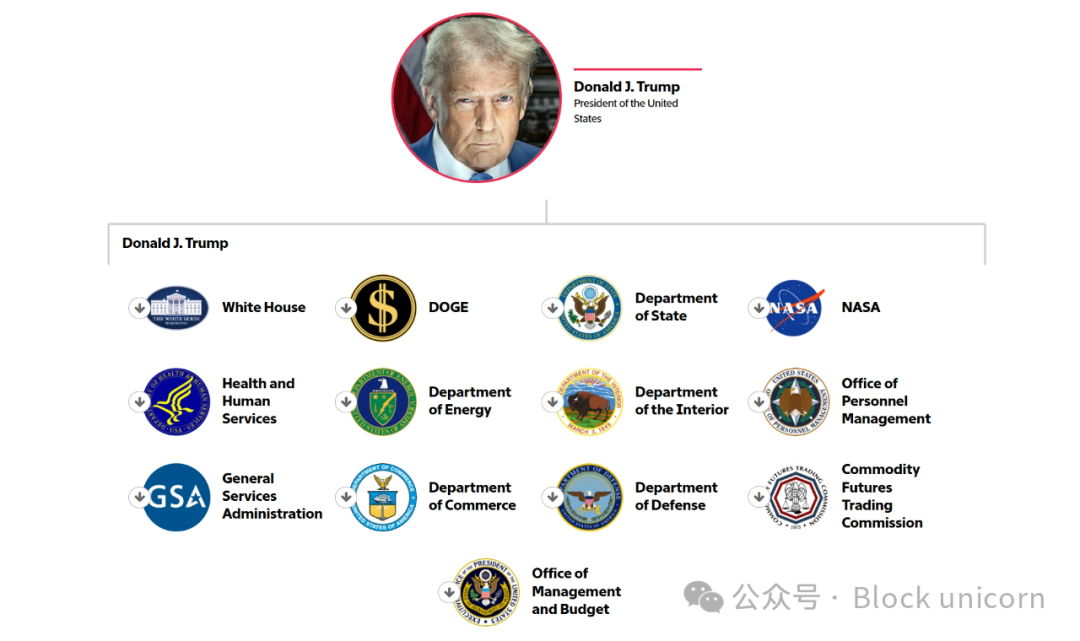Article written by: Julia Black
Article translation: Block unicorn

Preface:
- Several of the Trump administration’s technology appointees served in previous presidential administrations, including Michael Kratsios (Donald Trump’s first term), Abel Sutton (Donald Trump’s first term) and Jim O’Neill (George W. Bush).
- Elon Musk's Government Effectiveness Division recruited former employees from Musk's companies, some as young as 19.
- Many of Trump’s administration’s tech appointees and advisers were significant donors to his campaign, including Musk, Marc Andreessen, Jacob Helberg and David Sachs.
Silicon Valley is invading Washington
So far, much of the Silicon Valley invasion of Washington has focused on how Elon Musk and his company’s army of young technologists have been scouring the federal government for waste. But employees from other Silicon Valley companies are also playing important roles in the Trump administration.
In fact, you could almost call this administration the “A16Z administration.” Our organizational chart shows more than two dozen of the top technologists on Team Trump, including four current or former A16Z partners who have formal or informal roles in the Trump administration. This includes co-founder Marc Andreessen, who is an advisor to Musk’s government effectiveness division, and Scott Cooper, who serves as director of the Office of Personnel Management.
Trump plans to nominate Brian Quintenz, head of policy for A16Z's crypto team, to lead the Commodity Futures Trading Commission, Quintenz said in a post on X on Wednesday morning. Meanwhile, the firm's Jamie Sullivan is also assisting with the government efficiency department, while former A16Z partner Sriram Krishnan is an artificial intelligence adviser to the White House. A16Z's influence in the government is so deep that members of its talent team are helping recruit government staff, according to several people familiar with the matter.
The company’s involvement again highlights how high-tech influence over the U.S. government has risen dramatically over the past month, especially compared to Trump’s first term as president, when he clashed openly with the tech industry over issues ranging from immigration to content moderation.
But as his reelection campaign progressed, Trump began to signal that his interests increasingly converged with Silicon Valley’s — including funding large-scale artificial intelligence projects, deregulating the crypto market, overhauling defense procurement and cutting red tape for biotech entrepreneurs.
At the forefront are Musk and his staff at Government Efficiency, which shuttles through federal agencies and their technology systems, conducting sweeping audits and recommending layoffs. Musk’s lieutenants — including Steve Davis, Jayne Barahia and Amanda Scales — have stepped away from their day jobs at The Boring Company and xAI to assist with Government Efficiency.
Of course, running the country at the speed of a startup means Musk and his team have ignored questions about conflicts of interest, their handling of sensitive private data and even the legality of their actions. On Tuesday, Musk appeared in the Oval Office with Trump as the president signed an executive order consolidating the responsibilities of government efficiency departments.
When asked by reporters about potential conflicts that might arise from his numerous business interests, Musk did not answer the question, instead responding, "We operate with maximum transparency in all of our actions. In fact, I don't know of any organization that is more transparent than the Department of Government Efficiency."
There are signs that more people from the tech industry will continue to join the federal government. Last week, the Office of Personnel Management issued a memo announcing the redesignation of the senior executive service and chief information officer positions from career positions to political appointments. The change could open the door for these positions to non-traditional candidates from the tech and business fields.
A16Z isn’t the only investment firm making its mark in the administration. 8VC, founded by Palantir co-founder Joe Lonsdale, is drafting policy memos, like a recent report on health care, that appear to be blueprints for the new administration. And a string of Peter Thiel’s investment firms have become “gilded schools” for senior officials, including Vice President J.D. Vance.
There are already signs that some tech and business figures may not last long in government positions. Entrepreneurs including Vivek Ramaswamy and Loom co-founders Shahed Khan and Vinay Hiramat have left the government efficiency department within weeks of joining.
Some technologists are now expressing their excitement about suddenly having government power in their hands. Early Roblox employee John Shedletzky recently summed up the sentiment at X: “Silicon Valley built the modern world. Why can’t we run it?”















